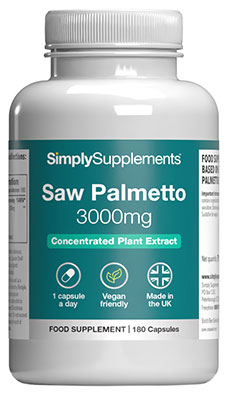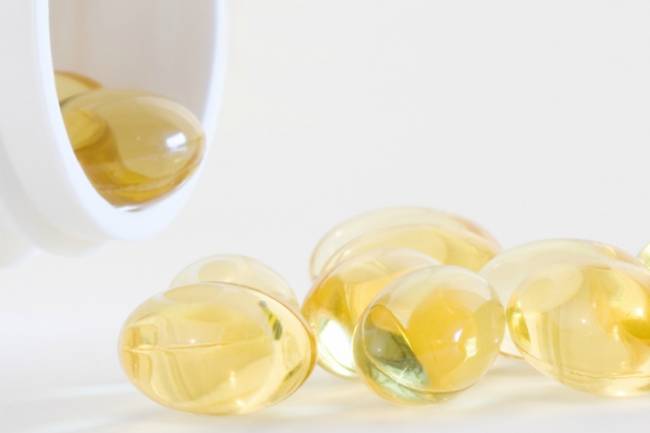Does Saw Palmetto Help PCOS?

Polycystic ovary syndrome (PCOS) is surprisingly common amongst women, with many having to live with its symptoms. There’s no current cure for the condition, with lifestyle changes being the most frequently prescribed assistance, but there may be an extra boost to your health that can be added.
Known for its effect on male hormones, saw palmetto may be able support the body normalise hormone levels in women with PCOS. But why are hormones important, and how exactly does saw palmetto help?
We’re here to explain the extent to which saw palmetto supplements are able to tackle the symptoms of PCOS, along with what, exactly, the supplement and condition do to the body. So, without further ado...
What is Saw Palmetto?
Saw palmetto – scientifically known as Serenoa repens – is a palm tree commonly found in Florida and other south-eastern states of America. It has been used in medicine for hundreds of years. The extract of the tree was used by both indigenous Americans and the Mayan people, for problems relating to the prostate and the urinary tract, amongst other issues.
Now, however, there’s growing scientific evidence as to these cultures’ use of saw palmetto. It’s been observed as helping the symptoms of benign prostatic hyperplasia, a swelling of the prostate that causes trouble with urination. Naturally, this makes the supplement popular with men, some of whom also take it to help conditions like male pattern baldness and low sex drive.
You might be wondering how this could possibly help a condition of the ovaries. To better understand, we need to take a closer look at PCOS.
What is PCOS?
Polycystic ovary syndrome, as the name might suggest, affects the ovaries of about one in five women, although only half of those will show symptoms. It causes small bumps called follicles to appear on the surface of ovaries – these are not life-threatening or dangerous.
It’s common for symptoms to appear in an individual’s late teens or early twenties, which can include:
• Gaining weight
• Irregular periods, or no menstruation at all
• Excessive hair growth on the body (the back, face and chest are common)
• Thinning hair on the head
• Sleep apnoea – difficulty breathing during sleep
• Difficulty conceiving
• Acne or greasy skin
• Mood swings, including anxiety and depression
While we don’t know exactly why certain women get the condition, there are a number of factors that do come into play, such as insulin resistance (which itself can cause weight gain) and hormonal imbalance. If you believe you may have PCOS it’s important to get it diagnosed professionally, as it can lead to infertility, type 2 diabetes and mental health issues.
At current, there’s no cure for PCOS, although a healthy lifestyle and diet can counter the symptoms and help bring them under control. Doctors will usually prescribe treatments for irregular periods and infertility though, such as contraceptive pills to balance menstruation, and more serious medications for those trying to conceive. Surgery to remove the follicles only tends to happen when other treatments are unresponsive.
PCOS and Androgens
As mentioned above, hormones are particularly important in PCOS; many of these symptoms are caused by one of its defining features: raised androgens levels in the body. These are typically known as “male hormones” (the most famous being testosterone) but they are present in everyone in healthy levels, and play an important role in child growth in the uterus and during puberty, again, for everyone.
Androgens cause what many might call “male characteristics” to develop in people, some of which coincide with the symptoms of PCOS: body and facial hair growth, baldness and acne. In women specifically, high levels will cause irregular periods, mood swings and eventually infertility.
Hormonal imbalance plays a major part in PCOS, as both a cause and in its symptoms. This is where saw palmetto can help – despite it being commonly used for male issues, it may be able to ease the symptoms of PCOS due to its unique properties.
Does Saw Palmetto Have an Effect?
What’s interesting about saw palmetto is how its extract acts without androgens in the body – the secret to its abilities. The extract contains fatty acids called liposterols. These prevent the conversion of testosterone into dihydrotestosterone (DHT), by inhibiting the enzyme involved in the conversion. This inhibition was observed in a 1984 study on saw palmetto extract, with the researchers commenting on its potential as an antiandrogenic.
DHT is one of the most potent androgens, and is a major proponent in the masculine-presenting symptoms of PCOS. One study found that a high DHT to testosterone ratio is present in those diagnosed with PCOS, so any treatments that are able to normalise that ratio will help ease the condition.
This also links back to saw palmetto assisting with benign prostatic hypoplasia: DHT can cause the prostate to grow in size. Having the supplement prevent the conversion of DHT will work towards the normalising of the prostate’s size. One consequence of stopping the conversion taking place is there’s more available testosterone, which plays a role in keeping the prostate healthy and in other conditions saw palmetto is commonly taken for, such as low sex drive.
As you can see, this conversion prevention is the crux of what makes saw palmetto effective in supporting against PCOS and other conditions, in both genders. What does need to be remembered is that DHT isn’t necessarily a bad hormone to have in the body, and at normal levels it’s harmless. It’s when too much is being converted from testosterone that issues can arise, since this may lead to imbalance and worsening health.
Side Effects
As with any supplement, there may be some side effect that might occur with saw palmetto’s use. Some of these could be potentially ignored by those who might think the effect is natural or ‘just happens’: breast enlargement or discomfort, lack of sex drive or halitosis. If any of these become worse than normal after using the supplement, consider cutting down or stop taking them.
Other more obvious side effects include stomach upsets, nausea, dizziness and headaches. In very rare cases people can have allergic reactions to the extract – if you experience any difficulty breathing, rashes or itching, see a doctor immediately and stop supplementation.
Again, all of these side effects are uncommon occurrences and shouldn’t overshadow the potential benefits that could be gained from taking saw palmetto. Care should be taken when in certain situations; because of its effects on hormone levels, it shouldn’t be taken by those who are pregnant, as it may disrupt the child’s development. In a similar vein, children under the age of 13 are discouraged from supplementing with saw palmetto, to prevent it from interfering with puberty and shifting hormone levels in the body. Lastly, saw palmetto can slow blood clotting, so those who have bleeding conditions or are currently on blood thinners are recommended to not take the supplement.
Conclusion
Thanks to the interesting properties of saw palmetto, its extract can be used as a supplement against some of the side effects of polycystic ovary syndrome. It can often feel like a condition that’s an uphill struggle to get under control – saw palmetto can be another way of supporting your body against its symptoms. As many of them can often be outward-showing, it may also give people a confidence boost, especially when combined with the healthy diet and exercise regime prescribed by doctors.
Speaking of doctors, don’t forget to consult them if you have any questions or concerns about taking saw palmetto, whether it’s due to other medication you’re taking or your current physical condition.
Sources:
https://www.webmd.com/vitamins/ai/ingredientmono-971/saw-palmetto
https://nccih.nih.gov/health/palmetto/ataglance.htm
https://www.medicalnewstoday.com/articles/322513.php
https://www.nhs.uk/conditions/polycystic-ovary-syndrome-pcos/
https://www.bbc.co.uk/news/world-44127615
https://www.bupa.co.uk/health-information/womens-health/pcos
https://www.lifeextension.com/Protocols/Male-Reproductive/Benign-Prostatic-Hyperplasia/Page-03
https://academic.oup.com/jcem/article/100/2/653/2814099
https://restorativemedicine.org/digest/saw-palmetto-may-reduce-elevated-androgens-and-prolactin-in-women-with-pcos/
https://www.sciencedirect.com/science/article/pii/0022473184902644
https://www.sciencedirect.com/science/article/pii/0022473184902644

 Richard
Richard 
























